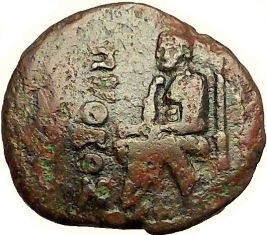
I’m studying Latin — a lively language, even if it’s nobody’s native tongue. Beginning students of Spanish learn to say “¿Dónde está la biblioteca?” (Where is the library?) and “Mi casa es grande y azul” (My house is large and blue). These sentences serve mere quotidian purposes. In Latin, we learn “Otium sine litteras mors est” (Leisure without literature is death) and “Angustus animus pecuniam amat” (The shallow mind loves money). These sentences soar with ancient wisdom.
Along with grammar and vocabulary, a language learner must study culture, since language and culture interlock. So far I’ve studied Rome’s legendary founding, its customs, and a few witty observations from Horace’s satires.
Romans were very concerned about the future, and among their many fortune-telling techniques is the Homeromanteion. To use this, you must formulate your question, then roll a dice three times. The resulting number corresponds to a numbered list of lines from the verses of immortal Homer’s
Illiad and
Odyssey. For example:
Line 335: “He promised that the people would stay safe and not perish.”
Line 622: “Remembering our talent, such as to us.”
Line 263: “They might feast here for the last and final time.”
You can test your fortune at the
online Homeromanteion, which comes complete with a virtual dice. Remember to pray to the gods so they will give you the wisdom to interpret the answer.
Vale (May you be well).
You can find more information on ancient fortune-telling at the British Library’s
medieval manuscripts blog.
You can browse an archive of the Latin Word of the Day and see the word’s use in a wisdom-filed sentence at
Transparent Language. From May 27: Hodie (today). Qui non est hodie cras minus aptus erit. (He who is not prepared today will be less so tomorrow.) Note the elegant juxtaposition of “hodie” and “cras” (tomorrow).
Published on May 01, 2019 07:21
 newest »
newest »
 newest »
newest »
 One friend described the study of modern languages as giving you the skills to ask the way to the bathroom. Latin gives you the skills to ask the way to Gaul, and to conquer it on your way back.
One friend described the study of modern languages as giving you the skills to ask the way to the bathroom. Latin gives you the skills to ask the way to Gaul, and to conquer it on your way back.





What are you using to learn Latin? If you're learning a living language, they teach you the practical things first. It's just practical to know 'Yo quiero cerveza' rather than some piece of ancient Spanish wisdom. But a dead language is usually preserved in what people thought was worth preserving. You don[t need to know hnow to say what you want because there's no-one around to tell.
Of course, if the EU had gone ahead and adopted Latin as its official language, then everyone might be tempted to ask 'who shall guard the guardians' whenever an election came up.